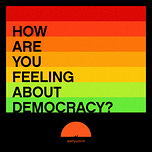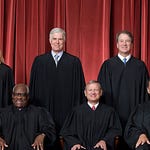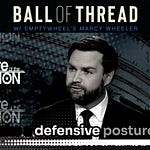Sarah Posner covers the Christian Right, so of course, she was one of the few journalists covering one of the biggest stories of this election so far.
The Republican Party is on the verge of an election win that could allow them to enact Christian Nationalism in the United States of America. This is true even though the far right’s signature policy, mercilessly banning abortion, is more reviled than ever. Rather than backing down, evangelicals have declared war on the separation of church and state and, thus, democracy itself.
Sarah Posner, author of Unholy: Why White Evangelicals Worship at the Altar of Donald Trump, clarifies how America's most potent political movement is coping with the tenuous but massive success gained through amoral matrimony with Donald Trump. And she helps us understand what the far right thinks when they see abortion rights winning big, even in Kansas.
Catch up on all the episodes of “How are you feeling about democracy?” here.
If you want to be a supporter of this podcast, please join us here at the earlyworm society – free or paid, your support matters.
*********
ROUGH TRANSCRIPT
Jason Sattler: Sarah, the headline of your latest newsletter, The Looking Glass, is " Big news about Christian nationalism, you might have missed above the fold of major newspapers." What is the big news and why did people miss it?
Sarah Posner: To the extent that major news outlets have covered the GOP platform, which was unveiled yesterday, missed the fact that this is a Christian nationalist platform . People missed it in part because the New York Times in particular, but also to a certain extent, other news outlets have been extremely focused on the questions about Joe Biden's age and wellness what the Democratic party is going to end up doing with what he's going to end up doing with regard to continuing in the race -- not that's not an important story, but the saturation coverage is much, too much. But you may have missed the news about Christian nationalism because of that.
Jason Sattler: Is that new for the Republican party? Have they had straight-up Christian nationalist platforms in the past?
Sarah Posner: Yes, they have talked about the Christian founding in the past and they've talked about eliminating abortion and undermining LGBTQ rights. These are all Christian nationalist goals. This one, I think a lot of reporters got spun by Trump, and the Trump campaign, because they changed the abortion plank in the platform.
It's not really a plank. It's just like a paragraph now. But it retains the personhood idea. So while it doesn't have a lot of the language that the 2016 platform had, about amending the constitution to have a personhood amendment or having a national ban on abortion. It does say that the reason why states can regulate abortion is because fertilized eggs have due process rights under the 14th amendment. Now, it doesn't say that in those words, but that's the meaning of the abortion paragraph in the platform. And so Trump has worked very hard at trying to get the media to write this story that Trump has moderated on abortion.
He's been aided in that effort by major figures on the Christian right and the anti abortion movement saying that they were angry that the abortion sections of the platform were going to be quote unquote, "watered down." But since the platform came out yesterday, most of them have said it's fine. It's fine because he has recognized these constitutional rights without coming out and saying the constitutional rights that he's recognized in this platform are constitutional rights for fertilized eggs, as opposed to constitutional rights for women seeking reproductive health care. I think that's one of the reasons why this got buried a little bit, because there was a lot of anticipation that Trump was supposedly going to moderate then that sort of fit a storyline that the platform softened the GOP's abortion position. And those were the stories that ran in major newspapers yesterday. But if you read it carefully, that it's still endorsing this person had idea, which is a very radical idea. promoted by the anti abortion movement.
The coverage has completely missed that he is proposing expansive quote unquote "religious freedom" rights for anti LGBTQ and anti abortion Christians. At the expense of everybody else.
NBC News: Anthea Butler is chair of religious studies at the University of Pennsylvania, and author of White Evangelical Racism.
America got started by people who were escaping religious autonomy so they could have religious freedom. And so one of the things I think is really important here in the delineation between what is Christian nationalism and what is not Christian nationalism is what are people trying to impose?
Are they trying to use their Christian nationalism to do a takeover?
Sarah Posner: And I think people are so used to Trump's bombast about Christians being persecuted in America and he's persecuted like Christians are because, he's been prosecuted for his crimes. So I just think that story just completely fell under the radar of the coverage of the platform.
Jason Sattler: And I think this has been a missed story the whole time. I think that there has been an effective you watch this in Arizona where they got the 1864 ban. They wanted to come into effect and then they pretended to moderate on that with this kind of implicit promise. It seems like this is how I read it.
Be quiet. I think actually the guy who wrote the Texas abortion ban literally said this and be quiet about this to Donald Trump, but we already think abortion is banned. We just need a president who tells everybody that. Is that what personhood means?
Sarah Posner: It's a signal to them that he agrees with their position on personhood.
PBS News: Julie F. Kay, a human rights attorney who defends reproductive rights in cases around the world.
Fetal personhood is kind of what we've seen in other countries, such as Ireland, that had a constitutional provision that equated the unborn with the mother or a pregnant person. And really what it does is try to hold a person's life at the same level as, uh, something that is either a fertilized egg or even before implantation and an embryo. And this is really about control. It's about who gets to decide whether, when, and with whom somebody gets to have a child or not. So what we're seeing here is really an attempt to broaden the anti abortion position to control not just abortion, but also contraception, IVF, um, and a whole host of some of the most fundamental human rights decisions that women make.
Sarah Posner: Now, he backed away quite purposefully from advocating for a national ban on abortion because he knows, Donald Trump knows, that's, would be an electoral loser for him to advocate for a national ban on abortion, but you can't on the one hand -- and this was, I think, something that was being pointed out by Tony Perkins, who's a Trump ally and a staunch opponent of abortion and he runs the family research council; he's like one of the leading figures on the Christian right -- and he basically said, it doesn't make any sense to say that this is a state's only issue. Basically saying, "If you're going to say that you advocate for personhood -- or you take for granted that personhood is the law of the land, which it isn't -- but if you take for granted that there is personhood, there are personhood rights for fertilized eggs, then it doesn't make sense to Tony Perkins that you would just leave it to the States. If you believe that, then you want to have a national ban because it's that's truly your belief, then the federal government should protect these constitutional rights. And I think the complaint that he's registering, he's not getting a lot of traction, I think, because the Christian right realizes the necessity of getting behind Trump at this juncture in the campaign. But I think his remarks are a strong signal of what they would do if Trump got elected.
I think they all know that Trump is doing this just for the general election. And if he got elected, then they certainly would pursue. a national ban.
Jason Sattler: They're eventually going to, they're going to go as far as they possibly can go and they're never going to give up the ultimate goal of a national ban there. But there was also coded other stuff that he implies that he can do that. He's not directly addressing this would be things like enforcing the Comstock Act, and this would be like limiting abortion pills, which have become the predominant way that abortions happen in America, not by directly banning them, but by putting these bureaucratic limits on them. To me, that's what the personhood seems like a signal. We're going to operate as if the 14th amendment protects fetuses in every state, and that's just the business we're doing.
Sarah Posner: And that, that it's also the federal government's duty to protect those rights. That's what logically flows from saying that. But it's phrased in such a way in the platform document that the casual reader might think that it's talking about somebody else's rights because it never actually says the word embryo or something like that in that sentence.
Jason Sattler: Donald Trump is really good at this coded language. A question I've always wanted to ask you is, did he win over the Christian right? Or did the Christian right win him over?
Sarah Posner: He won over the Christian right. Yes. He, one of his close friends, Paula White was his entree into the world of televangelism and Christian right activists. And they began to get behind him. She had already been behind him, but some of the heavy hitters had lined up behind Ted Cruz in 2016. But what they saw was the base really wanted Donald Trump. And so they followed along and then they started promoting this idea that he was God's anointed, that God had chosen him to restore the Christian nation that has been undermined by secularism and LGBTQ rights and feminism and abortion and all the rest.
The Project: And on June 14th, 1946, God looked down on his planned paradise and said, "I need a caretaker." So God gave us Trump. God said, I need somebody willing to get up before dawn, fix this country, work all day, fight the Marxists, eat supper, then go to the Oval Office and stay past midnight at a meeting of the heads of state. So God made Trump.
Sarah Posner: And that sometimes in response to inevitable pushback that, Donald Trump doesn't seem very Christian. Sometimes God chooses an unlikely leader to lead a to lead a nation at a critical juncture in its history. And Donald Trump is that leader for America. And so the base is really all in on that idea.
So the complaints by some of the Christian right leadership. in this cycle that they watered down the abortion plank, I'm not really sure it's going to really play with the base because the base has been told for eight years that Donald Trump has been chosen by God, that his first term was the most pro-life, most pro-religious liberty, most pro-Christian administration in history. It's really tough to pull people back from that, particularly when a lot of base voters don't read the platform, like to them that's not the most important thing. The most important thing is just listen to what Donald Trump says on true social or in social or at campaign rallies or what have you. So I think that this was some posturing on both sides, right? Like they know that he's watering it down to appeal to non-base voters or to trick non-base voters. But that they still have to put up this. pretense that they're really defending the more hardcore anti-abortion position.
Jason Sattler: They're all in on the con because they see how well it worked. I think that's a really important point that people miss is his first term really Was the most widely successful term for Christian nationals in American history. I don't see how you could see it any other way. He achieved their one big goal and set them up to just knock the rest of them down over the course of the next 20 years define deciding how fast they...
Sarah Posner: That's Right. And what the base remembers about him is that he brought about the end of Roe versus Wade, something that they've been waiting for. They've been waiting for 50 years.
Jason Sattler: And that gave him a lot of license, even during the primary where he was like, "Oh we went too far on. He was criticizing DeSantis that this ban was bad. No one takes him seriously, but he did do some separation for him for himself when he saw how badly 2022 went when without acknowledging that, He probably played a role in that somewhat.
Sarah Posner: Exactly. Exactly.
Jason Sattler: There's an article today in the New York Times about a schism that is happened between the federal society and Donald Trump and what that could mean for the Supreme Court. This is something you've written about in the past, and I hope it's starting to get more attention, how his Supreme court judges actually could be worse the next time around, something people can't even really possibly. I can't even fathom.
Sarah Posner: Can't speak to the the schism with Leonard Leo. I've done no reporting on that so I don't know to what extent that's that's actually the case or not, but there are other organizations who are promoting their own slate of possible judges or Supreme Court justices, similar in the way that Leonard Leo had done for Trump in his first term. So it was the Leonard Leo slash Federalist Society approved list. Now there are these other groups who are trying to make their own lists.
And the distinction, it seems to me between these two lists is that Leonard Leo's list was people who were Federalist Society members, although some of the people on the other lists are also Federalist Society members, but generally people who had gone to law school at Yale or Harvard, or, in Amy Coney Barrett's case, Notre Dame and had pursued a kind of traditional legal career path. Whereas the new lists that we're starting to see include people who have come out of the very deliberately created Christian legal world. So somebody like Kristen Waggoner of the Alliance defending freedom, she graduated from Regent University law school, became an advocate for this idea that, Christians, religious freedom is under attack and she, she litigated the Masterpiece cake shop case, the case in which they said that the, the baker had a religious freedom right to turn away a gay couple to make a cake.
ABC News: Jack Phillips says he's not just a baker, he's an artist
Couldn't you create a generic wedding cake that would be available for anybody who walked in and then customized for certain people, or is that against the...
That would, besides stepping the issue, that's still the government forcing me to create cakes for ceremonies that go against my faith.
You're well aware that history, historically, um, businesses have used religious exemptions to deny service to African Americans at hotels or restaurants or
I can't answer for that. All I can say is that that's not my belief at all.
Sarah Posner: So she's a product of this world in which lawyers are being educated at a law school like regents or Liberty University Law School where they're being taught that God's law should supersede, man made law and that really our legal system should be dictated from a Biblical worldview. So she comes out of that tradition she goes to work at Alliance Defending Freedom, which is basically promoting the same thing. So this is very different. Like people obviously recognized the theocratic. Leanings of judicial nominees like Amy Coney Barrett or Brett Kavanaugh, but this is on another scale and somebody like Kyle Duncan, who's also on some of these lists, worked at the Beckett fund for religious liberty, which conceived of and worked up the Hobby Lobby case. And, it's not like he's unknown to Leonard Leo, or that Leonard Leo. disagrees with this in any way, but he's more from that world of these religious freedom Christian legal organizations and law schools than some of the more traditional nominees have been. And we have every reason to believe that they would be even more aggressive in undermining church state separation and promoting the Christian nationalist idea that Christians have elevated religious freedom rights over everybody else.
Jason Sattler: And you mentioned that the GOP platform is a Christian Nationalist document and do you feel the same way about Project 2025?
Sarah Posner: Yeah, there's no difference. Project 2025 expresses a lot of the same ideas that, we're a Christian nation and that, but that Christian religious freedom is under attack and Christians are harassed and discriminated against and persecuted. And it envisions using the power of the federal government to vindicate those alleged infringements on religious liberty and freedom, which was something that they tried to do in Trump's first term too.
So like we do have some idea of what they would try.
Jason Sattler: Speaking of persecuted Christians, I actually found one. His name is Mike Pence. I wonder does he actually have any constituents any constituency left in the Republican Party? Or they just have completely abandoned him?
Sarah Posner: I don't think they've abandoned him. I think that he shares their, he shares all of these views that I just laid out in terms of Christian persecution and the need for Christian religious liberty to be elevated over church state separation, this ongoing project to elevate the Free Exercise clause for Christians over the Establishment Clause in, in the jurisprudence too. And so I think that they still see him as an ally. I think people, somebody like Tony Perkins would, he's been friends with Mike Pence for a long time. And probably some of the folks in Congress, Mike Johnson and folks like that they come out of the same world. And, but they also, recognize that to a lot of MAGA Pence was the enemy who didn't, who wouldn't listen to Trump on the fake electors. You don't really hear that much about him, to be honest. It's interesting. I don't, I wouldn't call it an abandonment of him because he's still a fellow traveler on all this other stuff. He's just not a fellow traveler on Trump.
Jason Sattler: How did you see January 6th from the point of view of someone who's been following the far Christian far right for so long?
Sarah Posner: So I think that the role of Christian nationalism in helping to propel January 6th was missed, I think, a lot by the media, not completely missed. There've been some stories about it. It was also completely avoided by the January 6th House committee, which was really unfortunate. Because they probably had the biggest platform to bring it to light. But you saw a lot in the run up to January 6th that there were Christian right organizations who were and activists who were promoting the stolen election lie and holding these Jericho March rallies on the National Mall where they, called for, God to intervene and reverse this fraudulent election and that. Biden was not the legitimate winner of the election and that Trump should be installed in office. And this employed a lot of the spiritual warfare language. That's really common, especially in the charismatic wing of the evangelical movement, basically saying, we're engaging the spiritual warfare to save America from these demonic forces that are undermining the Christian nation. And you could see how a lot of that rhetoric. Easily, translated into, I must go to the Capitol and be there and bring my Christian nationalist flag or pray in Jesus's name in the Senate chamber. And it was definitely there. They were not the, they were not the Oath Keepers who planned the, figured out where all the entryways were and how they were going to enter the building, the Capitol building. But there were unmistakable. Strands of Christian nationalism in the run up to January 6th and on the day itself.
Jason Sattler: And do you think the movement has changed the movement's relationship with Trump has changed much since your book UNHOLY kind of finishes with the first term be leading us up to January 6th. Do you think as you look back, I'm sure you'll do a sequel eventually. What would the sequel tell us about the, the first draft of the sequel has it changed or just gotten deeper?
Sarah Posner: I think that there are some people in the evangelical world who maybe are not thrilled with, they know in their heart that the whole, the Stormy Daniels trial and all of that is like not great, but nonetheless, they saw their leaders show up to defend Trump. Mike Johnson, Christian nationalist. extraordinaire, went to New York to defend Trump against this, this persecution trial, again, like they, they conflate the supposed persecution of Trump, their savior with the persecution of Christians who are trying to save Christian America from secularist ruin.
I think that there's a couple of things going on here. Obviously a lot of these people are not stupid. They can see a lot of Donald Trump's faults, but they also recognize that compared to every other previous president, including George W. Bush, who was a, a very close ally of theirs, he gave them so much power when he was in office.
They were always, open door for the oval office. They were always in the West wing. They would always have these events and prayer events in the white house. They had their They're functionaries installed as political appointees in various agencies. A lot of those people did draft Project 2025. So despite Trump's efforts to distance himself from it, obviously it was a lot of his loyalists who wrote the thing. And so I think that they're very loathe to back away from endorsing him again. They probably don't. Wonder if they'll ever have that kind of access again, if he doesn't become president. And in terms of their base, they recognize that the base has bought into MAGA and bought into Trumpism and that they more likely than other people, than other demographics in the population to believe the stolen election lie. More likely to support Trump. The polling data is still there that white evangelicals are supporting Trump at the same, pretty much the same rates they did in 2016 and 2020.
There's nothing that will cause them to back away from him. Even feeling angry that he supposedly watered down their abortion plank in the platform, they made a lot of noise over the past few weeks that they were going to be really angry if he watered it down and his functionaries in the RNC kept them out, kicked some people out of the platform committee and closed it to the press and made it a completely opaque process. And they were very angry about that. But again, it's just another one of those Trump things where it apparently is not enough for them to sever their ties with him.
Jason Sattler: If there's one thing Donald Trump was more successful at then appointing the judges at the Christian Nationalists liked it's pandering to Israel. I think that people you can mistake the power of the Jews have, and really what they're awed by is the power that the Christian right has. Does that sound right to you?
Sarah Posner: Christian Zionism is a huge part of evangelicalism. And so because evangelicals are such a huge and important part of the Republican base, Christian Zionism plays a huge role in Republican party politics. And so I think that, the Democrats do not have equivalent pressure from any of the Republicans. There any segment of their base that the Republican Party has from the Christian Zionist base, right? So if you might imagine that the Democratic Party is under immense pressure from the pro Palestinian camp it's nothing compared to the pressure that the Republican Party has from their Christian Zionist camp. And on top of that, I think a lot of the electeds in the Republican party come from that world, come from the evangelical world and are devoted Christian Zionists themselves. So I think in a lot of cases, they don't even require any convincing. They're just like fellow travelers with Christian Zionists.
Jason Sattler: Does their motivation match the popular conception that it's all about the end times, or is there a strategic goal that they hope achieve by being about being in favor of Israel?
Sarah Posner: This conversation happens on two planes. It happens on the theological plane where They're saying, we're doing these things because it's part of fulfilling biblical prophecy that will lead to the 2nd coming of Jesus. And they're quite explicit about that.
Al Jazeera English: The notion of Jews needing to give up their religion, having to convert to Christianity if they want their soul saved at the end times.
doesn't come up too much in the Evangelical broadcast since October 7th. It almost doesn't need stating, since it's a core part of the End Times narrative. Those who believe it have been taught that non Christians simply won't survive. The other reason it's not said explicitly is because is anti semitic.
Sarah Posner: But then on another plane, they say when we're operating on the political plane. We're really just demonstrating our love for the Jewish people in the state of Israel, and God commands us to love the Jewish people in the state of Israel. So we will do everything in the political plane to help the Jewish people in the state of Israel. But what that really means is they're really helping, the Netanyahu government and far-right settlers, as opposed to Jews in general, or even Israelis in general.
Jason Sattler: What is the alliance that America's Christian far right has with the far right in Israel and the rest of the world?
Sarah Posner: I think there are more, there's more than one thing going on. And in terms of Christian Zionism. They're very much aligned with, let's just call it the Netanyahu coalition and the settler movement and they're, they're against a Palestinian state they're for Jewish annexation of the West bank. And for complete Jewish control over, East Jerusalem. So for a long time, they have basically taken the side of the far right settler movement and called it support for Israel. I think their relationship with the global far is like when you bring that in, it's more complicated because I think that Christian Zionists see their role with respect to Israel as this very unique, um, special thing. And so I put it, I would put it in just a different category, but then, evangelicals and their other Christian and Catholic allies do see a global movement or advocate for a global movement against what they would call gender ideology, which is their scare term for, LGBTQ rights and particularly trans rights and abortion and, you know, they support far right parties who purport to share their positions on these issues the family or the family unit, or, recognizing and cherishing a country's Christian heritage and so on. But I think making those kinds of alliances complicates the Israel question. So sometimes it's it's not easy to understand this as one cohesive thing, because a lot of these other far right parties around the world are not they are antisemitic and some of them are not quote unquote "pro-Israel."
So it all gets like a little bit messier to explain.
Jason Sattler: And there's a lot of people who are very pro-Israel who could be regarded as antisemitic and use that as a
Sarah Posner: But
Yeah.
Jason Sattler: In your latest MSNBC piece, it's really an excellent piece about Mark Robinson, the best one and I've, great followup on the reporting by Greg Sargent, there's important tape where he ranting about how sometimes there needs to be killing.
Young Turks: Some folks need killing. It's time for somebody to say it. It's not a matter of vengeance. It's not a matter of being mean or spiteful. It's a matter of necessity.
Jason Sattler: And I'll probably include that tape in there go right there. And you make a note in there that he was defended by his own pastor, which I thought was an important point. And then we also have Josh Hawley outwardly saying that he is now a Christian nationalist, something that I don't think that there's ever had.
Daily Kos: Some will say now that I am calling America a Christian nation, and so I am, and some will say that I'm advocating Christian nationalism, and so I do.
Jason Sattler: I think Steve King had to resign for kind of even implying that about five or six years ago. So things have drastically changed in, in that way that …
Sarah Posner: I think I asked. I actually think that Steve King had to resign because
He said things that were white nationalist.
NBC News: In an interview with the New York Times, Republican Congressman Steve King defending what he called the culture of America. White nationalist, white supremacist, western civilization. "How did that language become offensive? "King asked...
Sarah Posner: And at the time, although maybe that has changed within the Republican party, maybe somebody wouldn't be forced out for that today. But I think other members of Congress and maybe Holly has done it before in this particular setting at the National Conservatism Conference. But, Marjorie Taylor Greene has done it.
Meet the Press: Here's Lauren Boebert. She's a freshman member of Congress from Colorado. She was speaking this summer to congregants. Here's what she said. The church is supposed to direct the government. The government is not supposed to direct the church. That is not how our founding fathers intended it. And I'm tired of this separation of church and state junk.
Sarah Posner: And I think there's been a lot of resistance in the Christian right to claiming the phrase Christian Nationalist. A lot of them think that it's just a left wing slur against Christians. And so they've rejected it. On that basis, basically claiming it's like this. It's this pejorative that the left uses for us. And so we won't claim it. But I think they're starting to realize that it really is a really good encapsulation of what their belief system. If you believe that God intended America to be founded as a Christian nation, and that has been undermined by secularism and it's your duty as a Christian, as a patriot to restore the Christian nation. Do we have a better description of that than Christian nationalism? And that's what Josh Hawley believes. So in a way it's, just finally very honest that he would claim it and embrace the term.
Jason Sattler: To go another step of honesty, I guess what I connected to is the coded the dog list. So you might say that in saying that I'm a Christian nationalist, that doesn't mean you're not talking about Reverend Wright. You do have Mark Robinson who actually is an African-American Christian nationalist and there are some, but the movement predominantly is, looks more like Steve King than it does look like Mark Robinson. What is the connection between the kind of Christian nationalists and white nationalists and where does it differ?
Sarah Posner: Obviously there's a lot of crossover and I'm not remembering precisely what Steve King had said. But I do think that it was much more explicitly white nationalist.
Now, of course, the Republican party has a lot of, white nationalists in its ranks. Trump, said of them that there were, they were one of the very fine people on both sides in Charlottesville and mainstreamed them in his 2016 campaign. I think the Christian right, there are a lot of people in the Christian right who would not use that kind of explicit white nationalist language, but are nonetheless, cheering Trump on about, when he talks about migrant invasions, they're very much in Trump's camp on immigration issues and they have fallen in line with the, anti-Black Lives Matter and anti critical race theory campaigns that have been staged by various operatives like Chris Rufo. They're there with it all. And it's really, if you look at a movement of people to overturn the 2020 election they're doing it because they have this conspiracy theory that the votes of white people have basically been defrauded by black people engaging or immigrants engaging in election fraud.
That is the unmistakable subtext of the stolen election lie. And that Trump is the one who will, restore the Christian America. And Biden is the one who has been engaging in anti-Christian bias or the Democrats have been engaging in anti Christian bias. It's all right there, even if they might not use some of the explicit language that the very outward white nationalists would use.
Jason Sattler: So there's been several tests for abortion rights since Roe was overturned and they've all gone on the side of abortion rights, all of them. There hasn't been one loss for abortion rights. How is the Christian right adapting that and what do they think about that? And do they think that's a real backlash or they can drown it out when it's a presidential election?
Sarah Posner: I think they're worried that it's a real backlash, but to their base, and I think it's important to remember that It's important to them to keep their base in a bubble, right? To their base, they continue to make the case that it's very important for Christians to get out to the polls in 2024 to vote for Trump, to, support their abortion position, to ensure that the Supreme court will be protected from, having nominations from another Democrat, all the rest, and. You don't really see them talking that much about those abortion ballot measures. I think that they're trying very hard to memory hold them and to pretend it didn't happen in order to encourage their base to get to the polls. Now, of course, they always have their backup plan, which is to say that there was election fraud and the election was stolen. And so I think that's, those are reasons why I think they like to That they like to keep their base in that in that bubble. And I think that they would also say, see what happens, if Christians don't go out to the polls, like maybe the reason why these abortion rights ballot measures passed or these anti abortion ballot measures failed was because enough Christians didn't get to the polls.
And so we're really going to motivate everybody to do that in the fall.
Jason Sattler: Sarah, it's been a pleasure following your work for years. They're really any time something breaks in the Christian National News, if you see a, "Under the Banner of Heaven" flag you wonder what it's all about. Sarah Posner is the one who can tell you she's been studying the Christian right and watching it become slowly the Establishment of the Republican Party and I imagine that has to be a little bit terrifying. But I want to thank you very much for doing it.
Sarah Posner: Thank you.















“This is a Christian Nationalist platform” with Sarah Posner